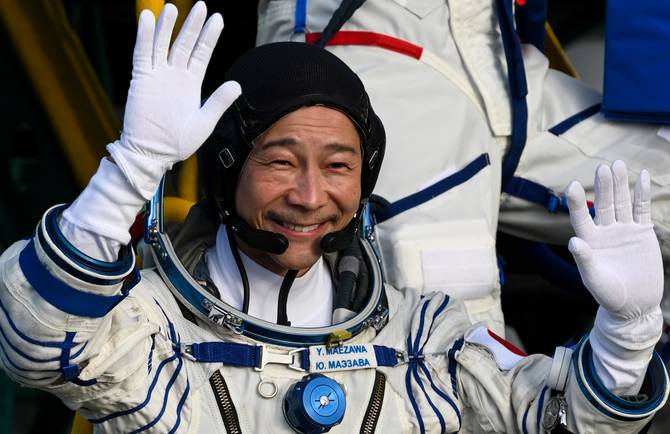Breakfast Notes #12 (The Best Neighbour, Democracy, Crypto's Sides)

Good morning. Japanese billionaire Yusaku Maezawa became the first self-funded tourist to visit the ISS in over a decade. He will spend 12 days aboard the space station, and Yozo Hirano, a video producer, is documenting the trip.

- Who is excited about a documentary about living in space?
The Best Neighbour We Can Be

As I enjoyed my leisurely walk this weekend, I noticed that many residents were taping their rubbish bins shut. I was curious as to why people would do such an inexplicable thing?
My friend explained to me that many residents have adorable, fluffy dogs. However, many of these dogs let loose on the neighbourhood and many times; they throw globs of faeces in their rubbish bins. This stinks up the trash can causing the tedious chore of disposing of one's rubbish to be even more unpalatable.

As I contemplated on this, I saw this cute little rubbish bin, equipped with plastic bags, a hand sanitiser and a small bin. A resident experienced the same problem, and instead of shutting their bins, they created a new bin for pet owners to dispose of their pets' gold.
This was such an ingenious way to manage this dirty issue! Both solutions imposed an inconvenience upon the owner, but one method was much more gracious, open-minded and likely to solve the problem.
The first method would merely cause frustration to the pet-walker and likely cause them to find the next open bin to dump the waste in. The second method would bring great relief to the pet-walker. They could even sanitise their hands of disposing of their pet waste. Most impressively, such a thoughtful solution generated a positive externality. Pet walkers are now more likely to dispose of their waste in the small bin, knowing that it would be taken care of and they could sanitise their hands, reducing the waste mismanagement of pet poop in the neighbourhood.
My takeaway from this is that when faced with a problem, our instinct might be to guard our resources jealously, but if we apply a little creativity and care, we can shape a happier kampung that we can all thrive in.
The Truth On The Summit Of Democracy

Today, President Joe Biden hosts representatives of more than 100 countries for a democracy summit. For me, the most interesting observation I had was how undemocratic the selection process was. It was as if the Biden Administration gets to decide who is counted as a democracy unilaterally.
It reminded me of Ho Beng Seng's insightful commentary on the unique nature of American power globally. America could be seen as an anti-colonial imperialist power in his eyes and mine. Although its global reach reflects its imperial tendencies, in its repudiation of local administration, America is anti-colonialist.
Professor Ho elaborates,
T-shirts and jeans? The American imperialism which succeeded Britain’s was markedly different in character. Features such as military occupation, colonial administration, and the dependent status of local sovereigns were all moved from the open, formal, acknowledged public sphere to that of covert operations.
In the American empire, there are no Indian durbars with Her Majesty’s Governors in starched white tunics and feathered hats surrounded by colourful rajas and sultans. The ruling image, rather, is that of remote control—of invisibility, in fact. The passing of the baton is marked by the progress from gunboat diplomacy to aerial bombing.
Considering their intervention in the Middle East; their involvement had only become visible when they viewed their ally forces as weak and have supposedly messed up. Their drones, UAVs and troops swoop in and save the day. In doing so, they show who's the real boss and that any American ally relationships will be unequal.
Interestingly, America does not formally recognise the existence of hierarchy in its relations with foreign sovereigns, unlike all previous empires. There is no more need for tributes, ostentatious gifts, and kneeling before the throne; America treats everyone as friends. (or at least on the surface)
Dominance, intimacy, and consequence that flow from the relationship remains unacknowledged.
Thus, the right criteria to judge the success of this Summit for America is not about if America got the guestlist right or whether 'an affirmative agenda for democratic renewal' has been set or if 'the greatest threats faced by democracies has been tackled through collective action' but whether America's imperial strength remains tacitly acknowledged by international leaders.
Visualization Of The Day

1997: Jeff Bezos delivers a package to Amazon’s one-millionth customer.
2021: Jeff Bezos delivers Dwayne "The Rock" Johnson with an award at the People's Choice Awards.
My Take on Cryptocurrencies That No One Asked For

Crypto-assets (Cryptocurrencies, NFTs and the like) have become an investing mania again, which means everyone is looking to cash in on this new trend.
Crypto is so new that even some people inside it don’t understand it nor know of any practical implications. Coupled with its Wild-Wild-West market landscape, it simultaneously attracts diehard true believers and cynical critics.
I prefer a sobering approach and would like to point out what I think to be the biggest upside and downside of cryptocurrencies for all to consider.
The greatest upside of cryptocurrencies is the competition and innovation they will induce in the traditional financial industry. The promise that with cryptocurrencies, you could send millions of dollars to anybody with a small transaction fee in less than ten minutes would force banks and financial institutions to ramp up their digitisation efforts. In other words, the promise of decentralisation is likely to accelerate the reality of efficient and cheaper centralisation.
Our veteran economist minister, Tharman, also says that the best 'future will be one where regulated stable coins will have a useful role in a traditional payment system that innovates and becomes more interoperable across borders for cheap, fast and instant payments.'
Yet, the greatest downside is also its decentralisation. The benefit of centralisation is the presence of an honest broker. He knows who you and the other party are. The transaction leaves with it paper trails, names and faces. If things ever go south, the middleman can help solve the problem. This is why asset freezes in the past had been effective in derailing terrorist funding and various criminal activities. With the promise of anonymity, it seems apparent that such features would invite abuse.
I am no crypto-expert nor a financial advisor, but I believe crypto, like many new disruptive technologies, will impact the world but not in the way we think.
May the sun shine upon your face,
Keith